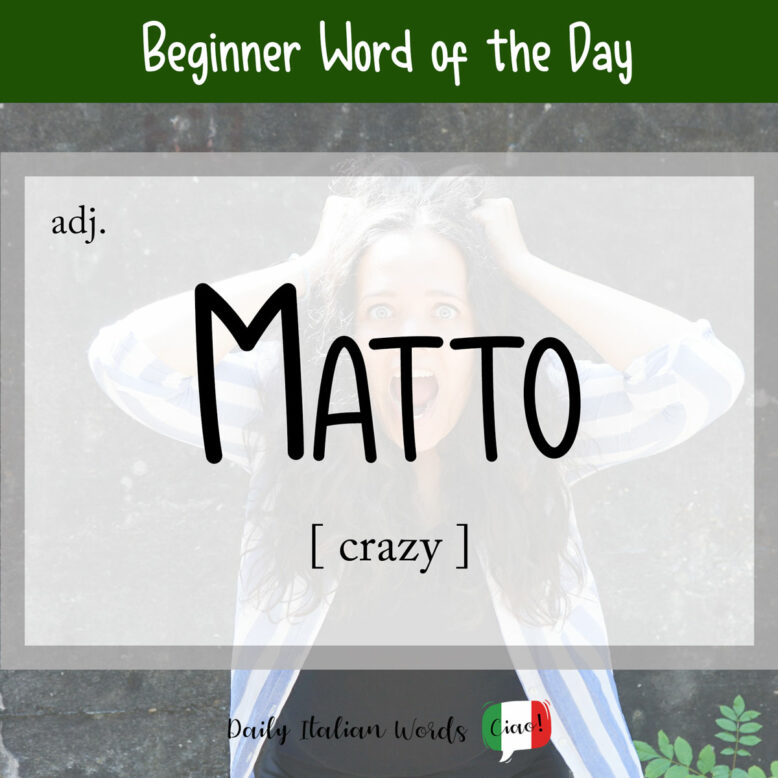Matto is one of many ways you can translate the word crazy into Italian. It is thought to come from the late Latin mattus, which means drunk, and later assumed the meaning of stupid before acquiring its current definition.

Because matto is an adjective, the masculine singular ending –o changes to –a for the feminine form, -i for the masculine plural form, and -e for the feminine plural form. For example:
- un gatto matto = a crazy cat (masculine, singular)
- una persona matta = a crazy person (feminine, singular)
- dei gatti matti = crazy cats (masculine, plural)
- delle persone matte = crazy people (feminine, plural)

In addition to essere (to be), matto often appears in the company of the verbs andare (to go) and diventare (to become).
Vado matto per i gatti!
I’m crazy about cats!
È diventato matto dopo aver scontato dieci anni di carcere.
He went mad after spending ten years in prison.
Did you know that…?
The word for checkmate in Italian is scacco matto. Scacco, in its singular form, means both chess piece and Check! whereas the plural scacchi is the name given to the game of chess.
Like many adjectives in Italian, matto can also function as a noun with the meaning of lunatic, madman or crazy person.
A way to say that someone has literally gone crazy or is acting like a crazy person is dare di matto (lit. to give like crazy).
Just like the English Are you crazy?, Italians will use Sei matto? with someone who says or does absurd things. Another interesting expression is Fossi matto! (lit: If I were crazy!) which is used as a response to categorically refuse to accept or do something.
Ti va di vedere questo film? Dura sei ore. – Fossi matto!
Do you want to see this film? It’s six hours long. – What do you think I am, crazy?
When matto modifies a noun, it takes on the meaning of intense, enormous or insatiable in colloquial Italian. For example:
Ho una voglia matta di andare in vacanza!
I’m dying to go on vacation!
(lit: I have an intense desire to go on vacation!)

Then we have other interesting expressions with the word matto in its plural form:
- C’è da diventare matti (con questo traffico)! = (This traffic) is enough to make you go mad!
- Roba da matti! = Crazy stuff! (lit. stuff of crazy people)
- Mi piace da matti! = I’m crazy about it!
- È una gabbia di matti! = It’s a madhouse! (lit. it’s a cage of crazy people)
Common synonyms for matto are pazzo and folle.
Idioms featuring the word ‘matto’
Essere matto da legare
Literal translation: to be crazy enough to be tied up
English meaning: to be stark raving mad
Essere matto come un cavallo
Literal translation: to be crazy like a horse
English meaning: to be unpredictable (used in a kind or playful way)
Essere come il matto dei tarocchi
Literal translation: to be like the fool of the tarot cards
English meaning: to be everywhere and always appreciated
La Casa in Via dei Matti Numero Zero (The House on Madman Street Number Zero)
This cute children’s song is one of my son’s favourites at the moment. It was recorded in Italian by singer-songwriter Sergio Endrigo in 1969 but the original music and lyrics are by Brazilian poet Vinicius de Moraes.
Era una casa molto carina
Senza soffitto senza cucina
Non si poteva entrarci dentro
Perché non c’era il pavimento
Non si poteva andare a letto
In quella casa non c’era il tetto
Non si poteva fare pipì
Perché non c’era il vasino lì
Ma era bella, bella davvero
In Via dei Matti numero zero
Ma era bella, bella davvero
In Via dei Matti numero zero
It was a lovely house
Without a ceiling, without a kitchen
You couldn’t go inside
Because there was no floor
You couldn’t go to bed
There wasn’t a roof on that house
You couldn’t have a wee
Because there wasn’t a potty there
But it was beautiful, very beautiful
On number zero, Madman Street
But it was beautiful, very beautiful
On number zero, Madman Street
Heather Broster is a graduate with honours in linguistics from the University of Western Ontario. She is an aspiring polyglot, proficient in English and Italian, as well as Japanese, Welsh, and French to varying degrees of fluency. Originally from Toronto, Heather has resided in various countries, notably Italy for a period of six years. Her primary focus lies in the fields of language acquisition, education, and bilingual instruction.


